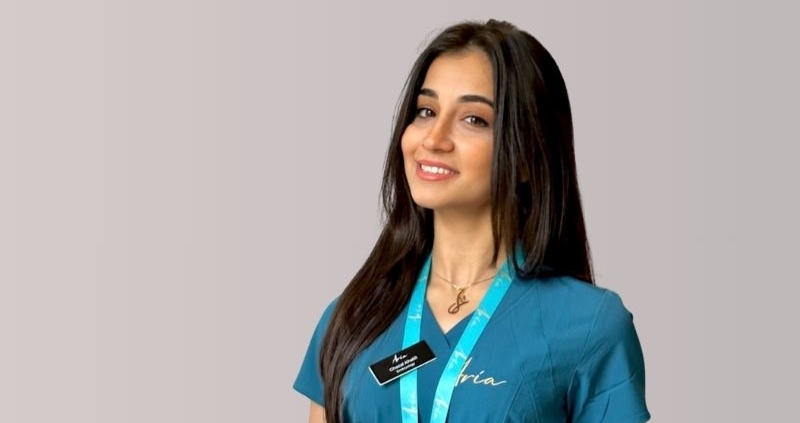“The moment I stepped into the IVF lab, I knew I had found my true calling”
2025 marks the 10th anniversary of the International Day of Women and Girls in Science, which focuses on closing the gender gap in science. To celebrate this important day, we interviewed Aria Embryology Practitioner Ghazal Khalili about what drew her to a career in reproductive science and her journey so far.
Why were you drawn to a career in embryology?
I originally wanted to pursue a career in paediatrics because I am interested in caring for and helping children. However, after observing doctors in a hospital setting, I realised that the emotional demands of that role were not the right fit for me.
My desire to work in the medical field, particularly with children, remained strong, so I shifted my focus to embryology and IVF. During my undergraduate studies, I had the opportunity to shadow professionals in a fertility clinic for the first time. The moment I stepped into the IVF lab and explored its various facets, I knew I had found my true calling.
What education did you pursue to become an embryologist?
I earned a first-class Biomedical Science degree from the University of Warwick, during which I undertook a placement year as a trainee Andrologist at the University Hospitals Coventry.
Following this placement, between my second and third years of study, I completed an eight-week summer research project at the Sheffield University Hospitals under the guidance of Professor Allan Pacey. This project focused on investigating the advantages of microfluidic devices compared to traditional sperm preparation methods in IVF settings. This happened during the COVID pandemic, which made training even more difficult.
These experiences significantly enhanced my scientific knowledge and research skills in the field of reproductive science.
What stage are you at in your career?
I am in my second year of the Scientific Training Programme (STP) in embryology, where I am gaining academic knowledge and practical experience. I work as a trainee embryologist, and as part of the programme, I travel to Manchester University for exams and academic training.
Additionally, I receive hands-on practical experience at Aria under the supervision of Dr Xavier Gonzalez, where I apply what I’ve learned in a real-world setting. This combination of training and studying simultaneously provides me with a well-rounded experience as I continue developing my clinical embryology skills.
What training do you do at Aria to optimise the skills necessary for specific procedures?
I am supported by a comprehensive training plan and a dedicated training officer throughout my learning process. Some key areas of my training include:
- Oocyte retrieval
- Assessment of oocyte maturation
- Sperm processing for fertility treatments (IUI, IVF, ICSI)
- Sperm analysis and cryopreservation
- Embryo grading and assisted hatching (using the embryoscope)
- Preparation of culture dishes and tubes for treatment days
- Communicating embryo development updates to patients
- Handling of liquid nitrogen
- And more…
Who do you work with in the lab?
In the lab, I work with senior embryologists and embryologists.
What is a typical workday for you?
A typical day for me could begin with oocyte retrieval in the morning, followed by assisting my colleagues with various tasks, such as calling patients and providing updates. I may focus on andrology in the afternoon or prepare for the next day’s procedures.
When I’m involved in set-up, my responsibilities include printing patient notes, verifying all HFEA mandatory consents and blood work to ensure accuracy, and reaching out to patients to explain the upcoming steps from the lab’s perspective. I also encourage them to ask any questions they may have. Finally, I prepare culture dishes and embryoscope slides before the next day’s treatment procedures.
How often do embryologists interact with fertility patients? Do you enjoy the balance of lab work and patient contact?
Embryologists interact with patients regularly, primarily over the phone, to provide updates on their embryos/gametes. However, some patients prefer minimal contact until the final stages of their treatment, which we respect and document accordingly.
For patients undergoing egg retrieval and IVF cycles, there are occasions when they wish to discuss questions regarding their eggs or sperm samples, at which point we engage in face-to-face conversations at the recovery area in our clinic.
Personally, I find in-person interactions more fulfilling than phone conversations, as they allow for better communication through body language and expressions. This is especially helpful when delivering difficult news, as it’s easier to gauge how the patient reacts and provide support accordingly.
Overall, I genuinely enjoy the balance between lab work and patient contact – it creates a stronger connection and allows me to be more involved in the patients’ fertility journeys.
Is there an area of fertility that you’d like to specialise in?
I hope to be a fully-trained clinical embryologist by the end of my STP programme.
What new or future developments in IVF are you most excited by?
I’m particularly excited about the advancements in stem cell-based embryo models. Studying embryo models could provide insights into the development of genetic diseases and potential therapeutic targets. Using stem cells to develop embryo models could offer groundbreaking opportunities for understanding and improving fertility treatments. It’s exciting to think about how these developments could shape the future of reproductive medicine.

